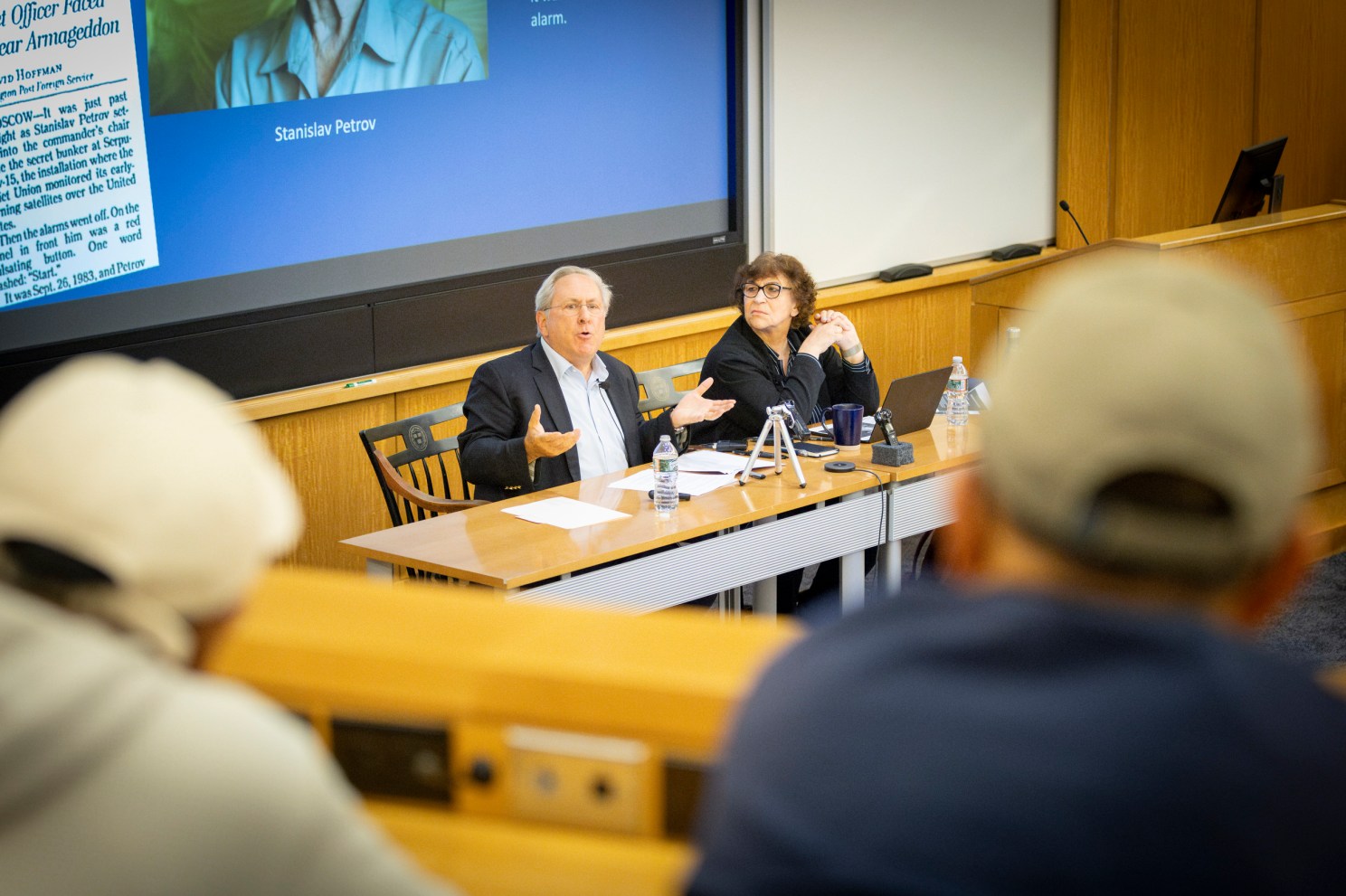
David Hoffman (left) and Yevgenia Albats.
Niles Singer/Harvard Staff Photographer
World appears on track for even more dangerous Cold War 2.0
Pulitzer winner warns China, which is building nuclear arsenal, would be third major player besides U.S., Russia — and six other nations now have bombs, too
China has significantly picked up the pace of expanding its nuclear arsenal in recent years, a development that increases the likelihood a new arms race will begin revving up, one that could be more dangerous than the Cold War contest between Russia and the U.S., according to two-time Pulitzer Prize-winning journalist David Hoffman.
In a talk on Tuesday, sponsored by the Davis Center for Russian and Eurasian Studies, Hoffman raised the alarm about a “new nuclear age,” with three countries leading the pack and a handful of other countries already developing their own nuclear weapons.
“It’s time for us to wake up,” said Hoffman. “It’s time for us to get over the vacation that we’ve had since the end of the Cold War.”
“Nuclear weapons are political weapons. They’re instruments of threat and of coercion, and they require political will to restrain. ”
David Hoffman
The period of geopolitical tension between the U.S. and the Soviet Union, and their respective allies, began in 1946 and ended in 1991 with the fall of the Soviet Union. That year, President George H.W. Bush and Soviet leader Mikhail Gorbachev signed the Strategic Arms Reduction Treaty (START), which called for both nations to reduce their nuclear arsenals. The initiative to control nuclear weapons was first proposed by President Ronald Reagan in 1981. The START treaty will expire in February 2026.
A new arms race poses all the risks for nuclear Armageddon as before and then some, said Hoffman. It will multiply the possibilities for mistakes and misperceptions, and it will take effort to find out whether the other two competitors are U.S. adversaries, he said.
“A three-way race will be infinitely more difficult to negotiate than was the Cold War between two sides,” said Hoffman. “A three-way race with all the different kinds of forces, threats, and possibilities is a bit like a diplomatic Rubik’s cube. It’s not going to be easy to use diplomacy to solve it.”
Hoffman, who won his first Pulitzer for his 2009 book, “The Dead Hand: The Untold Story of the Cold War Arms Race and Its Dangerous Legacy,” said he worries about the lack of political will among world leaders to rid the world of nuclear weapons.
“Nuclear weapons are political weapons,” Hoffman said. “They’re instruments of threat and of coercion, and they require political will to restrain. Reagan and Gorbachev for their own reasons summoned up the political will to get rid of these weapons … Now we’re at a time of growing danger, a time when political will is absent, and that’s why I’m alarmed.”
A contributing editor to The Washington Post, Hoffman won his most recent Pulitzer this year for a series of editorials on technologies and tactics used by authoritarian regimes to stifle dissent. He noted that China has 500 nuclear warheads and may reach 1,000 by 2030, according to the Pentagon.
“China seems to be planning to try to match the United States and Russian nuclear arsenals to get to about 1,500 warheads,” said Hoffman. “China is accelerating the arms race, and I think it’s very worrisome that China refuses to enter into negotiations. The Chinese basically say, ‘Wait till we get to be peers with Russia and the United States, and then we’ll talk about that.’’’
The fear of a nuclear war is not unfounded, said Hoffman, not only because there are more nuclear-armed countries — a group that includes France, the U.K., Pakistan, India, North Korea, and Israel — than ever before, but also because of the potential impact of artificial intelligence on early warning systems.
The possibility of a false alarm that could lead to a nuclear attack is real, said Hoffman, who wrote about a series of failures in the U.S. early warning system for ballistic missile defense in his book about the Cold War.
Between 1960 and 1976, there were seven false alarms, and between 1979 and 1980, there were five. In 1983, the Soviet early warning system also registered a false alarm. And more recently, in 2022, India accidentally fired a missile into Pakistan. India later said it was due to a “technical malfunction” during routine maintenance.
“We cannot grow complacent about the possibility of mistake, a misperception or a misunderstanding leading to a nuclear explosion,” said Hoffman. “If artificial intelligence says, ‘We’re under attack,’ would you believe it? Would you not believe it? Would you put the fate of the Earth in the hands of ChatGPT?”
This week’s event was part of the series “Russia: In Search of a New Paradigm — Conversations with Yevgenia Albats,” a prominent Russian investigative journalist and political scientist who received her Ph.D. in political science from Harvard in 2004 and is currently a visiting scholar at the Davis Center.
Although the scenario seems bleak, Hoffman said the U.S. could take actions to prevent a nuclear apocalypse, including strengthening ties with U.S. allies, and working on nuclear weapons risk-reduction measures and robust arms control treaties with both China and Russia.
“American people just have to hear that this looming arms race is coming in,” said Hoffman. “Ultimately, though, it comes back to political will … Because that’s ultimately the way to restrain political weapons … I’d love to see us get back to that Reagan-Gorbachev magic moment.”




